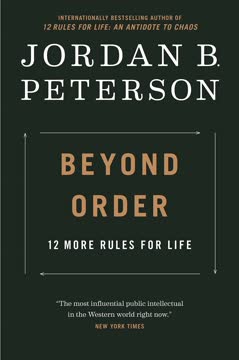Key Takeaways
1. Virtues and attributes shape our character and society
Moralising is a person who seeks to impose upon others his view of how they should live and behave.
The essence of morality. Morality is not about imposing one's views on others, but rather about cultivating virtues that contribute to personal growth and societal harmony. Key virtues include:
- Tolerance: Accepting differences in beliefs and lifestyles
- Mercy: Balancing justice with compassion
- Civility: Treating others with respect and consideration
- Compromise: Finding middle ground in conflicts
- Courage: Facing challenges and fears
These virtues, when practiced collectively, create a foundation for a just and compassionate society. However, it's crucial to recognize that morality is not about rigid rules, but about fostering understanding and empathy among diverse individuals.
2. Tolerance and civility are essential for harmonious coexistence
To understand all is to forgive all.
Embracing differences. Tolerance and civility are cornerstones of a peaceful society. They involve:
- Respecting diverse viewpoints and lifestyles
- Practicing active listening and empathy
- Engaging in constructive dialogue
- Avoiding prejudice and discrimination
By cultivating these qualities, we create an environment where different ideas can coexist and flourish. This doesn't mean accepting harmful behaviors, but rather approaching differences with an open mind and a willingness to understand.
3. The paradox of happiness: Pursuit vs. attainment
Happiness depends on wisdom.
Understanding true happiness. Happiness is not merely a state of contentment or satisfaction, but a result of living a meaningful and purposeful life. Key aspects include:
- Pursuing personal growth and self-improvement
- Cultivating meaningful relationships
- Engaging in activities that provide a sense of accomplishment
- Finding balance between pleasure and purpose
The paradox lies in the fact that actively pursuing happiness often leads to disappointment, while focusing on living a fulfilling life tends to result in genuine happiness as a byproduct.
4. Confronting societal ills: Racism, nationalism, and religious intolerance
Race has no basic biological reality.
Dismantling harmful ideologies. Racism, nationalism, and religious intolerance are destructive forces that hinder social progress. To combat these issues:
- Educate ourselves and others about the lack of scientific basis for racial distinctions
- Recognize the artificial nature of national boundaries and identities
- Promote interfaith dialogue and understanding
- Challenge our own biases and prejudices
By addressing these issues, we can work towards a more inclusive and equitable society that values diversity and human dignity.
5. The power and peril of human emotions: Love, hate, and revenge
All a man can betray is his conscience.
Navigating complex emotions. Human emotions play a crucial role in shaping our experiences and relationships. Understanding and managing emotions like love, hate, and revenge is essential for personal growth and social harmony.
- Love: A powerful force for connection and empathy, but can also lead to possessiveness and jealousy
- Hate: Often rooted in fear and ignorance, can be overcome through education and understanding
- Revenge: A natural impulse that ultimately perpetuates cycles of violence and suffering
Learning to channel emotions constructively and develop emotional intelligence is key to personal and societal well-being.
6. The complexities of morality and the human condition
Defeat is a thing of weariness, of incoherence, of boredom, and above all, of futility.
Embracing moral complexity. Morality is not a simple set of rules, but a nuanced understanding of human nature and the consequences of our actions. Key considerations include:
- Recognizing that good intentions can lead to harmful outcomes
- Understanding the role of context in ethical decision-making
- Balancing individual rights with societal responsibilities
- Acknowledging the potential for growth and redemption
By embracing the complexities of morality, we can develop a more compassionate and nuanced approach to ethical challenges.
7. Education and reason as pillars of personal and societal growth
Only the educated are free.
The power of knowledge. Education and reason are fundamental to personal empowerment and societal progress. They enable:
- Critical thinking and informed decision-making
- Personal growth and self-actualization
- Social mobility and economic opportunities
- Civic engagement and democratic participation
By fostering a culture of lifelong learning and rational discourse, we can create a more enlightened and equitable society.
8. The arts and leisure: Gateways to self-discovery and cultural enrichment
You use a glass mirror to see your face; you use works of art to see your soul.
Cultivating creativity and reflection. The arts and leisure activities play a vital role in personal and cultural development. They offer:
- Opportunities for self-expression and introspection
- Exposure to diverse perspectives and experiences
- Emotional catharsis and stress relief
- Cultural preservation and innovation
Engaging with the arts and pursuing meaningful leisure activities can lead to a richer, more fulfilling life and a more vibrant society.
9. Health and well-being: Balancing body, mind, and spirit
Health exists for life, and life exists for the love of music and beautiful things.
Holistic approach to wellness. Achieving true health and well-being involves nurturing all aspects of our being:
- Physical health: Regular exercise, balanced nutrition, and adequate rest
- Mental health: Stress management, emotional regulation, and cognitive stimulation
- Spiritual health: Finding meaning, purpose, and connection
By adopting a holistic approach to health, we can enhance our overall quality of life and contribute positively to our communities.
10. The significance of memory and history in shaping our future
To remain ignorant of what happened before you were born is to remain always a child.
Learning from the past. Understanding history and cultivating collective memory are crucial for personal and societal growth. They allow us to:
- Learn from past mistakes and successes
- Develop a sense of identity and cultural continuity
- Anticipate and prepare for future challenges
- Foster empathy and understanding across generations
By engaging with history and preserving important memories, we can make more informed decisions and build a better future for generations to come.
Last updated:
Review Summary
The Meaning of Things receives mixed reviews, with many praising its thought-provoking content and accessible format. Readers appreciate Grayling's wide-ranging knowledge and the book's bite-sized essays on various philosophical topics. Some find it stimulating and insightful, while others criticize Grayling's bias against religion and conventional wisdom. The book is generally regarded as a good introduction to philosophy for beginners, though some readers disagree with certain arguments. Overall, it's seen as a engaging read that encourages reflection on life's big questions.
Similar Books










Download PDF
Download EPUB
.epub digital book format is ideal for reading ebooks on phones, tablets, and e-readers.









